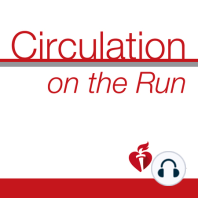16 min listen
Circulation July 09, 2019 Issue
ratings:
Length:
24 minutes
Released:
Jul 8, 2019
Format:
Podcast episode
Description
Dr Carolyn Lam: Welcome to Circulation on the Run, your weekly podcast summary and backstage pass to the journal and its editors. I'm Dr Carolyn Lam, Associate Editor from the National Heart Center and Duke National University of Singapore. Dr Greg Hundley: And I'm Greg Hundley, also Associate Editor from the Pauley Heart Center at VCU Health in Richmond, Virginia. Dr Carolyn Lam: I'm so excited about our feature discussion today, Greg, because it is about a familiar but very important problem of hypertension, and we will be looking at trial results of a new drug, a first in its class type of drug. And tackling a problem that is particularly important perhaps in black patients with hypertension. Well, more very soon. First, let's discuss some papers, shall we? Do you have one? Dr Greg Hundley: My paper is from Joseph Burgoyne from King's College in London and pertains to resveratrol. Now, resveratrol is a non-flavonoid polyphenolic compound that has been found in the skin of several fruits, with the most notable being grapes. The compound exhibits beneficial effects, including the prevention of cardiovascular neurologic diseases, cancer, metabolic syndrome, as well as it promotes bone and eye health. And in this study, the investigative team explains how resveratrol may mediate its numerous beneficial effects including lowering of blood pressure by direct thiol oxidation. Also, they demonstrate that resveratrol can counter-intuitively induce direct protein oxidation, a process that is enhanced under pro-oxidative conditions associated with disease. The oxidation of cyclic GMP dependent protein kinase 1 alpha, or PKG1 alpha, by resveratrol lowers blood pressure in hypertensive mice. Dr Carolyn Lam: Okay. But what does that mean for us clinically, Greg? Dr Greg Hundley: Well, the results demonstrate how blood pressure can be lowered by using resveratrol, and targeting cysteine 42, or PKG1 alpha, may provide a new class of anti-hypertensive agents. In addition, identifying additional proteins modified by resveratrol may provide new targets for therapy to treat cardiovascular disease. Carolyn, how about your first paper? Dr Carolyn Lam: We are going to look at the further results of the ODYSSEY OUTCOMES trial. And as a reminder, ODYSSEY OUTCOMES was a double-blind randomized comparison of the PCSK9 antibody Alirocumab with placebo in almost 19,000 patients who had an acute coronary syndrome 1-12 months previously and elevated at the atherogenic lipoproteins despite intensive statin therapy. And that trial found that Alirocumab reduced the risk of the primary composite outcome of coronary heart disease, death, ischemic stroke, myocardial infarction, or unstable angina requiring hospital admissions. The current paper looked further at the effects of Alirocumab on death. Dr Greg Hundley: So Carolyn, what did they find? Dr Carolyn Lam: Well, there are quite a number of findings here. The first, there were fewer deaths in total that occurred with the PCSK9 inhibitor Alirocumab versus placebo, and this resulted from a non-significantly cardiovascular and non-cardiovascular deaths with Alirocumab. The second finding was that in a pre-specified analysis of more than 8,200 patients eligible for 3 or more years of follow-up, Alirocumab reduced death. And then, the third finding was that patients with non-fatal cardiovascular events were at increased risk for both cardiovascular and non-cardiovascular deaths, and a post-Hoc analysis found that compared to patients with a lower LDL, those with a baseline LDL above 100 had a greater absolute risk of death, and a larger mortality benefit with Alirocumab. In the Alirocumab group, all cause death declined with a lower achieved LDL achieved at 4 months of treatment to a level of a
Released:
Jul 8, 2019
Format:
Podcast episode
Titles in the series (100)
Circulation June 6, 2017 Issue: Circulation Weekly: Your Weekly Summary & Backstage Pass To The Journal by Circulation on the Run
